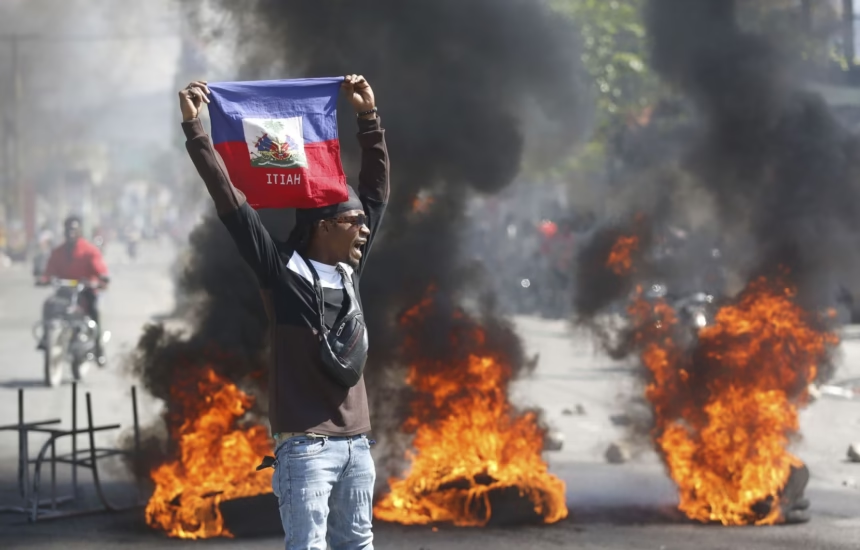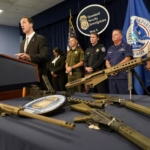A group of Democratic senators is demanding answers from Secretary of State Marco Rubio and the Department of Homeland Security (DHS) regarding U.S. policy toward Haiti.
In a letter sent Wednesday, the senators criticize what they describe as serious inconsistencies and a double standard in the Trump administration’s approach, particularly its efforts to terminate Temporary Protected Status (TPS) for Haitians amid worsening conditions on the ground.
In this letter addressed to Secretaries Marco Rubio (State Department) and Kristi Noem (Department of Homeland Security), Senators Edward J. Markey (D-MA) and Raphael Warnock (D-GA) request explanations concerning what they call “fundamental contradictions” in the United States’ foreign and immigration policy toward Haiti. The letter also raises concerns over a reported formal agreement between Haiti’s transitional government and a U.S. private military company (PMC) led by Erik Prince, the founder of Blackwater Worldwide.
The senators express concern over the involvement of the PMC in armed operations on Haitian soil, stating that a response is expected no later than August 15, 2025.
In the letter, released by their offices on July 24, the senators write: “According to recent reports, a U.S.-based private military company is conducting armed operations in Haiti under a formal contract with the country’s transitional government.” They argue that this situation raises urgent questions regarding compliance with U.S. arms export laws, potential complicity in serious human rights violations, and broader contradictions in the United States’ foreign and immigration policy.
The senators also highlight concerns over the potential use by the PMC of armed drones, military-grade equipment, and American personnel in a country grappling with extreme violence and political instability. “Armed drone operations, weapons shipments, and the deployment of U.S. mercenaries clearly constitute activities that require export licenses,” they note.
Sens. Markey and Warnock present several initial questions focusing on legal transparency and compliance:
-
“Has any U.S.-based private military company applied for or received export licenses to provide defense articles or military services in Haiti? If so, please identify the companies and provide copies of those licenses.”
-
“Were the licenses reviewed under NSPM-10, Section 3(d), to assess risks to international peace and human rights? If so, please share the findings. If not, please explain why.”
NSPM-10 (National Security Presidential Memorandum 10) mandates a rigorous review of military exports to ensure they do not contribute to human rights abuses. The senators suggest that failure to conduct such a review could constitute a violation of U.S. law or reveal troubling legal ambiguity.
The letter also addresses the United Nations-backed Multinational Security Support (MSS) mission in Haiti. The senators ask whether an interagency analysis was conducted to determine if the PMC’s operations could undermine or conflict with the MSS:
-
“Has the State Department assessed whether the PMC’s activities align with, duplicate, or contradict the UN’s MSS mission? If so, please share the results. If not, please explain why.”
This line of questioning highlights potential gaps in coordination between U.S. diplomacy and international peacekeeping efforts in Haiti, which the senators argue may be undermined by uncoordinated private military initiatives.
The senators also turn their attention to the Haitian National Police (PNH), questioning whether U.S.-supported units are compliant with the Leahy Law, which prohibits the U.S. government from funding foreign security forces credibly accused of human rights abuses. They ask explicitly:
-
“Have these units been vetted under Leahy Law standards? If so, please provide the results. If not, please explain why.”
The lawmakers further emphasize contradictions in the administration’s approach to Haiti, pointing out what they describe as an increasingly incoherent foreign policy. They highlight DHS’s ongoing efforts to terminate TPS protections for Haitians, even as the State Department urges U.S. citizens to leave Haiti due to deteriorating security.
-
“How do you justify the contradiction between the State Department’s support for armed stabilization efforts in Haiti and DHS’s push to end TPS for Haitians currently in the United States?” the senators ask.
In a sixth point, they raise concerns about Haiti’s inclusion in the U.S. travel ban list while simultaneously being deemed safe for TPS beneficiaries to return to:
-
“How does the administration reconcile placing Haiti on the travel restrictions list for security concerns while also claiming the country is safe enough for deportations?”
The letter is signed by a significant group of Democratic senators and one independent. In addition to Markey and Warnock, signatories include Chris Van Hollen (MD), Elizabeth Warren (MA), Bernie Sanders (VT), Alex Padilla (CA), Adam Schiff (CA), Peter Welch (VT), and Cory Booker (NJ).
The senators set a firm deadline of August 15, 2025, and state that they expect a full briefing from the State Department and DHS detailing the decisions, evaluations, and legal justifications involved.
This initiative comes amid continued tension between the Trump administration’s international engagements and domestic immigration priorities. Some observers have criticized what they see as an increasing reliance on military solutions for immigration enforcement. Others underscore the contradictions in offering security assistance abroad while tightening restrictions on Haitians inside the United States.
The letter from Senators Markey and Warnock, notable for its depth and assertiveness, reflects a clear objective: to hold the administration accountable through detailed and fact-based responses, in accordance with U.S. legal standards.
In the coming weeks, the administration’s responses will be closely scrutinized—not just as part of a political dispute, but as a test of the coherence of U.S. policy in balancing security commitments abroad with the protection of vulnerable populations at home and the Trump administration immigration policy about Haitian immigrants in the United States.






